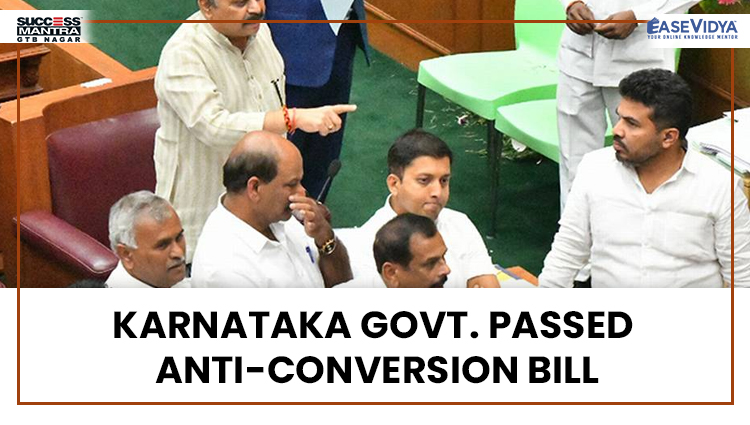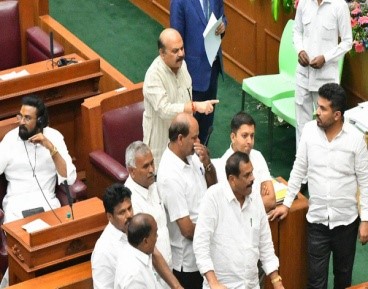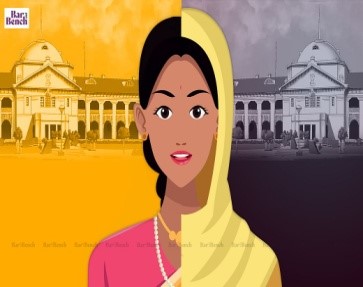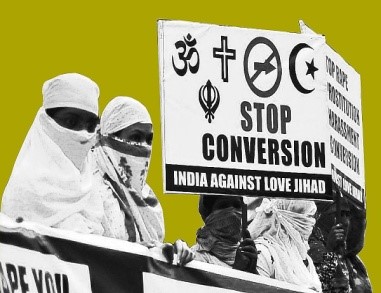
KARNATAKA GOVT PASSED ANTI CONVERSION BILL
KARNATAKA GOVT. PASSED ANTI-CONVERSION BILL
Recently, the Karnataka Protection of Right to Freedom of Religion Bill, 2021 was introduced in the state assembly of Karnataka. The Bill prohibits conversion from one religion to another by misrepresentation, force, fraud, allurement or marriage. Other States like Arunachal Pradesh, Chhattisgarh, Gujarat, Himachal Pradesh, Jharkhand, Madhya Pradesh, Odisha, Uttar Pradesh and Uttarakhand have also passed laws restricting religious conversion.

Current Affairs Notes By Success Mantra Coaching Institute GTB Nagar Delhi CLICK HERE
MAIN PROVISIONS OF THE BILL
- Penal Provision: The offense of conversion is cognisable and non-bailable offense. It will attract a jail term of three to five years and a fine of Rs 25,000 for people found violating the law and a jail term of three to 10 years, and a fine of Rs. 50,000 for people converting minors, women and persons from the SC and ST communities.
- Locus Standi Doesn’t Apply: According to the proposed legislation, complaints of conversions can be filed by family members or relatives or any person in association.
- Exemption: The Bill provides an exemption in the case of a person who “reconverts to his immediate previous religion” as “the same shall not be deemed to be a conversion under this Act”.
- Provision for Willing Person: After the law comes into force, any person intending to convert to another religion will have to inform the district magistrate at least thirty days in advance. This will be followed by an inquiry to be conducted by the district magistrate through the police to establish the real intent of conversion. Not informing the district magistrate will lead to the conversion being declared null and void.
What happens if the bill is not passed by the Legislative Council?
- If the Legislative Council does not pass the anti-conversion bill then the government will have other options, as the legislative councils in the states are not as powerful as the Rajya Sabha.
- The Legislative Council can only delay the bill but does not have the authority to make any changes to it.
- If the council rejects the bill, it will go back to the Legislative assembly, which can pass it again with or without amendments and pass it again to the Legislative Council.
- If the legislative council rejects it for the second time or more than a month has passed since the bill was tabled in the council, then the bill will be considered to have been passed by both the houses of the state legislature.
ANTI-CONVERSION LAWS IN INDIA
Constitutional Provision: The Indian Constitution under Article 25 guarantees the freedom to profess, propagate, and practise religion, and allows all religious sections to manage their own affairs in matters of religion; subject to public order, morality, and health. However, no person shall force their religious beliefs and consequently, no person should be forced to practice any religion against their wishes.
Existing Laws: There has been no central legislation restricting or regulating religious conversions. However, since 1954, on multiple occasions, Private Member Bills have been introduced in (but never approved by) the Parliament, to regulate religious conversions. Further, in 2015, the Union Law Ministry stated that Parliament does not have the legislative competence to pass anti-conversion legislation. Over the years, several states have enacted ‘Freedom of Religion’ legislation to restrict religious conversions carried out by force, fraud, or inducements.

PRAVAHINI Current Affairs Notes By Success Mantra Coaching Institute GTB Nagar Delhi CLICK HERE
ISSUES ASSOCIATED WITH ANTI-CONVERSION LAWS
- Uncertain and Vague Terminology: The uncertain and vague terminology like misrepresentation, force, fraud, allurement presents a serious avenue for misuse. These terms leave room for ambiguities or are too broad, extending to subjects far beyond the protection of religious freedom.
- Antithetical to Minorities: Another issue is that the present anti-conversion laws focus more on the prohibition of conversion to achieve religious freedom. However, the broad language used by the prohibitive legislation might be used by officials to oppress and discriminate against minorities.
- Antithetical to Secularism: These laws may pose a threat to the secular fabric of India and the international perception of our society’s intrinsic values and legal system.

Supreme Court on Marriage and Conversion:
- Hadiya Judgment 2017: Matters of dress and of food, of ideas and ideologies, of love and partnership are within the central aspects of identity. Neither the State nor the law can dictate a choice of partners or limit the free ability of every person to decide on these matters. The principle that the right to marry a person of one’s choice is integral to Article 21.
- S. Puttaswamy or ‘privacy’ Judgment 2017: Autonomy of the individual was the ability to make decisions in vital matters of concern to life.
- Lata Singh Case 1994: The apex court held that India is going through a “crucial transformational period” and the “Constitution will remain strong only if we accept the plurality and diversity of our culture”. Relatives disgruntled by the inter-religious marriage of a loved one could opt to “cut off social relations” rather than resort to violence or harassment.
- Soni Gerry case, 2018: The SC warned judges from playing “super-guardians”, succumbing to “any kind of sentiment of the mother or the egotism of the father”.
- Salamat Ansari-Priyanka Kharwar case of Allahabad High Court 2020: The right to choose a partner or live with a person of choice was part of a citizen’s fundamental right to life and liberty (Article 21). It also held that earlier court rulings upholding the idea of religious conversion for marriage as unacceptable are not good in law.
- Other Judgements: The SC in its various judgments, has held that faith, the state and the courts have no jurisdiction over an adult’s absolute right to choose a life partner. India is a “free and democratic country” and any interference by the State in an adult’s right to love and marry has a “chilling effect” on freedoms. Intimacies of marriage lie within a core zone of privacy, which is inviolable and the choice of a life partner, whether by marriage or outside it, is part of an individual's “personhood and identity”. The absolute right of an individual to choose a life partner is not in the least affected by matters of faith.
CONCLUSION
The governments implementing such laws need to ensure that these do not curb one’s Fundamental Rights or hamper the national integration instead, these laws need to strike a balance between freedoms and malafide conversions.
TEST YOURSELF
Q.1 Which of the following states has become the 10th State to pass the anti-conversion bill which prohibits conversion from one religion to another by misrepresentation, force, fraud, allurement or marriage?
- Karnataka: ANSWER
- Jharkhand
- Tamil Nadu
- None of the following
Q.2 In recent times many States have passed anti-conversion laws restricting religious conversion. Which of the following is not one of them?
- Chhattisgarh
- Gujarat
- Himachal Pradesh
- Punjab: ANSWER
Q.3 Which of the following articles of the Indian Constitution guarantees the freedom to profess, propagate, and practise religion, and allows all religious sections to manage their own affairs in matters of religion?
- Article 32
- Article 25: ANSWER
- Article 39
- All of the above
Q.4 Which of the following landmark judgments held that the right to choose a partner or live with a person of choice was part of a citizen’s fundamental right to life and liberty (Article 21)?
- Salamat Ansari-Priyanka Kharwar case: ANSWER
- S. Puttaswamy or ‘privacy’ Judgment, 2017
- Hadiya Judgment 2017
- None of the following
Q.5 Which of the following statements is/are incorrect in the context of concerns over interfaith marriages?
- Interfaith marriages are believed to be a forced conversion
- Hindu religion allows polygamy: ANSWER
- The Special Marriage Act, 1954 is not compatible with backwardness of the society.
- None of the above













0 Comment